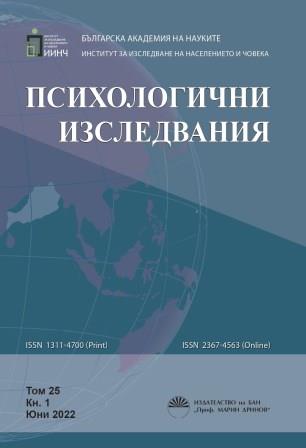Positive Youth Development and Mental Health Among Bulgarian Adolescents: the Protective Role of Confidence and Connection
Positive Youth Development and Mental Health Among Bulgarian Adolescents: the Protective Role of Confidence and Connection
Author(s): Anna Alexandrova-KaramanovaSubject(s): Psychology, Personality Psychology, Clinical psychology
Published by: Институт за изследване на населението и човека - Българска академия на науките
Keywords: Positive Youth Development (PYD); depression; perceived stress; psychosomatic complaints; adolescents.
Summary/Abstract: Positive Youth Development (PYD) focuses on the strengths and positive qualities and outcomes in young people. Lerner’s 5Cs model defines positive development by five aspects: Competence, Confidence, Connection, Character, and Caring. Research has demonstrated that the 5 Cs and other PYD dimensions are positively associated with positive mental well-being and negatively associated with mental health problems in adolescents. The aim of the study is to examine the levels of the 5Cs of Positive Youth Development and indicators of mental health (depression, perceived stress, and psycho¬somatic complaints) and to explore their relationships in a representative sample of Bulgarian middle adolescents (N=1517). Data from the Bulgarian 2017/2018 Health Behaviour in School-Aged Children (HBSC) study were utilized. Measures included the Positive Youth Development Scale – short form, the Center for Epidemiologic Studies Short Depression Scale (CES‐D-R-10), the Cohen Perceived Stress Scale (PSS-4), and the HBSC-Symptom Checklist. High prevalence of depression (35,6%), perceived stress (70,2%), and multiple recurrent psychosomatic complaints (57,5%) was found among Bulgarian adolescents, all being more prevalent in girls compared to boys. Depression, perceived stress, and psychosomatic complaints were significantly negatively associated with Confidence and Connection and these associations remained significant after being adjusted for gender and socioeconomic status. The proportion of explained variance by the 5Cs was 10% for depression, 14% for perceived stress and 16% for psychosomatic complaints. The identified protective effect of Confidence and Connection has important implications for implementing the 5Cs of PYD as an approach for promoting youth mental health and preventing mental health problems.
Journal: Психологични изследвания
- Issue Year: 25/2022
- Issue No: 1
- Page Range: 7-19
- Page Count: 13
- Language: English

